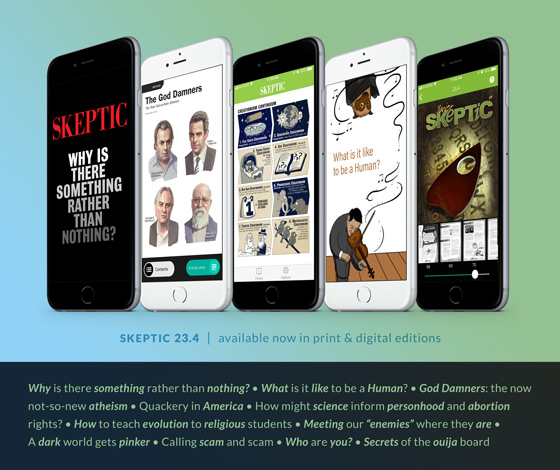SCIENCE SALON # 49
Dr. Gad Saad — Doing Gad’s Work
In this episode of the Science Salon Podcast, Michael Shermer talks to the renowned evolutionary behavioral scientist and Concordia University professor Dr. Gad Saad. Starting with his escape to Canada from war-torn Lebanon, Dr. Saad recounts how he got interested in the study of human nature in general and consumer behavior in particular through the evolutionary lens, why people make the choices they do in the marketplace, why evolutionary psychology is an equal-opportunity offender to both the political left and right, what’s wrong with the Blank Slate model of human nature, what it means to hypothesize that something evolved “for” an adaptive reason, how evolutionary psychologists test their claims, the consilience of human knowledge, epistemological humility, postmodernism and how it has corrupted the academy, and the vital importance of free speech and free inquiry in science and society.
Dr. Gad Saad held the Concordia University Research Chair in Evolutionary Behavioral Sciences and Darwinian Consumption from 2008 to 2018. He is the author of The Consuming Instinct (2011, Prometheus Books) and The Evolutionary Bases of Consumption (2007, Lawrence Erlbaum), editor of Evolutionary Psychology in the Business Sciences (2011, Springer), and is finishing his next book on idea pathogens and how they have spread like a contagion in the academy, now spilling out into government and corporations. He is the host of the popular podcast The Saad Truth, which focuses on science, religion, political correctness, multiculturalism, postmodernism, third-wave feminism, Islam, safe spaces, trigger warnings, and many other topics.
Listen to the podcast via Apple Podcasts, Spotify, Google Podcasts, Stitcher, iHeartRadio, and TuneIn.
This Science Salon was recorded on December 26, 2018.
Check Us Out On YouTube.
Science Salons • Michael Shermer
Skeptic Presents • All Videos
If you enjoy the video, audio, and written content we produce, please show your support by making a donation. Your ongoing patronage is vital to our organization’s mission to promote science and critical thinking.

In this article from Skeptic magazine 23.2 (2018), regular columnist Carol Tavris reminds us that the human need for touch is significant. Tavris is the coauthor of Mistakes Were Made (but Not by Me): Why We Justify Foolish Beliefs, Bad Decisions, and Hurtful Acts.
Please Touch
Here are a few small studies you can do on your own to introduce this column’s subject:
- Sit in a coffee shop and watch people who are eating together. Count how many times one person touches the other as they converse. If you live in a large city, you should have a wealth of diverse individuals to observe; if your coffee shop is monocultural, you might have to do a little traveling. Many years ago, Sidney Jourard did this in San Juan (Puerto Rico), Paris, London, and Gainesville (Florida).1 His scores were: San Juan, 180; Paris, 110; London, 0; and Gainesville, 2.
- Examine the photos of survivors of any horrible event—a natural disaster, such as flood or fire, or a human-made disaster, such as a mass shooting or bomb. Try to find an image of survivors standing apart from one another, arms crossed in front of them. You can’t, can you? Total strangers as well as neighbors will be hugging each other, whether stoically or in tears, for comfort and support.
- If you can find some little kids to watch, your own or anyone else’s (or if you remember being a little kid yourself), observe what they typically do when they fall and hurt themselves, have a scary nightmare, or feel lonely: run to a loved adult for a comforting cuddle.
- Listen to what people say when a gift or experience moves them emotionally and when they reconnect with old friends: “I’m touched,” they say, and “I’m sorry we lost touch.” Notice they don’t say “I’m hearing” or “I’m sorry we lost smell.” What is the touch that has touched them?
- Observe all the signs in museums that say “don’t touch.” If touching were not a natural impulse, why tell us repeatedly (and often uselessly) not to do it?
Touch is the often the last, but not the least, of what are considered the five basic senses, following vision, hearing, smell, and taste. But it is just as crucial for human survival; the need to touch and be touched emerges the minute a baby is hatched. Babies are born with a grasping reflex—they will cling to any offered finger—and it’s abundantly clear, from the pioneering research of the British psychiatrist John Bowlby and the psychologist Harry Harlow, that babies crave as much “contact comfort” as they can get. Infants who get little touching and cuddling will grow more slowly and release less growth hormone than their amply cuddled peers, and throughout their lives, they will have stronger reactions to stress and be more prone to depression and its cognitive deficits.2 Babies who are raised with “creature comforts” but not contact comfort may be physically healthy but emotionally despairing, remote, and listless. […]
PRE-ORDER THE AUTOGRAPHED PAPERBACK
Heavens on Earth by Michael Shermer
Autographed paperback only $15.92, available January 8, 2019
Heavens on Earth is a scientific exploration into humanity’s obsession with the afterlife and quest for immortality from the bestselling author and skeptic Michael Shermer. In his most ambitious work yet, Shermer sets out to discover what drives humans’ belief in life after death, focusing on recent scientific attempts to achieve immortality along with utopian attempts to create heaven on earth. Pulitzer Prize-winning author of Guns, Germs, and Steel, Jared Diamond, wrote:














